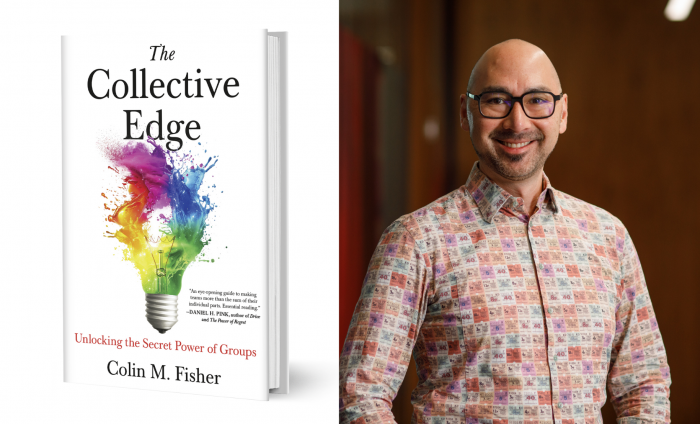
In his new book The Collective Edge, UCL School of Management’s own Associate Professor Colin Fisher explores the power and potential of cooperation and group dynamics – from creative teams and political movements to dinner table conversations, Colin distils decades of research into practical strategies to help groups thrive.
To mark the launch of The Collective Edge, we sat down with Colin to talk about the inspiration behind the book, key take aways for professionals and what’s next for Colin.
Congratulations on the launch of The Collective Edge! What inspired you to write this book?
In a way, the world was asking me to write it more than I was looking to write it. There’s nothing more important—and overlooked—than group dynamics. Today, teams dominate the landscape for breakthrough ideas. And the world’s biggest problems are caused by issues in group dynamics, from boring work meetings to dysfunctional families to warring nations. Yet, too many people still default to individualistic explanations and solutions to our biggest problems. I’m hoping the book can help change that by offering practical advice on how to make the groups and teams in your life better, as well as making the science underlying that advice engaging for a wide audience.
How does the book build on your previous research?
It has actually been really fun to write a book that my research is a part of, but only a relatively small part. My research on leading, helping, and coaching groups is a part of the book. But, because most people haven’t thought much about group dynamics, I give a tour of the entire history of group dynamics research in this book.
I suppose the format gives you more freedom to explore?
Absolutely! Academic papers and books like The Collective Edge are completely different animals. It has been really interesting to embrace writing for a broader audience, trying to synthesise ideas and make them more digestible.
The book explores group dynamics from a range of examples – from basketball teams to Star Trek Villains—how did you choose your case studies?
Choosing which cases and examples to use is a really important decision! The main message of the book may be about principles that can help any team, but our brain loves narratives and stories. For many readers, stories are the main attraction. I chose a mix of important cases from business like my own research on the design firm IDEO and stuff I find fun – basketball, sci-fi, crazy cults. I think the mix of examples is one thing that sets the book apart – it leads off with revealing the true villain of the Harry Potter stories!
Thinking about the book itself, what’s one thing a team leader could do tomorrow to improve group performance?
If there were an easy answer to this, you wouldn’t need a whole book! The first thing I’d advise a leader to do is to analyse the DNA of their group – its structure. Most groups in organisations are too big – the ideal size is 4.5 people, with groups of between three and seven members being the most efficient. If groups are given demotivating tasks, or if they lack clear goals they will struggle. But changing structure is often difficult. It’s not a one-day project. You should ask questions about why things are structured as they are and how to change them and encourage your teammates to do the same. That will get you started on the path to change.
Was there a moment during your research that surprised you or changed your perspective?
There were a lot of different things. One thing I needed to do more research on when writing the book was on the relationship between diversity and group performance. When I was in grad school, we were taught that there was a ‘goldilocks’ point of different backgrounds and perspectives and that you needed to communicate and coordinate effectively. But when I actually looked at the research I found that any kind of diversity bringing different information and perspectives to a group had a positive effect on performance. The hypothetical negative effects of diversity on group performance appeared mostly to be from external parties rather than people actually in those groups.
And what’s next for your research or writing?
I have several terrific PhD students, with whom I’m studying how creative work gets done. And I’ve still got a lot of writing to do to make research on groups more accessible for a broad audience, so watch this space!
The Collective Edge will be published in the UK by Simon & Schuster UK on August 28 2025. It will be published in the US by Penguin Random House on September 2 2025.